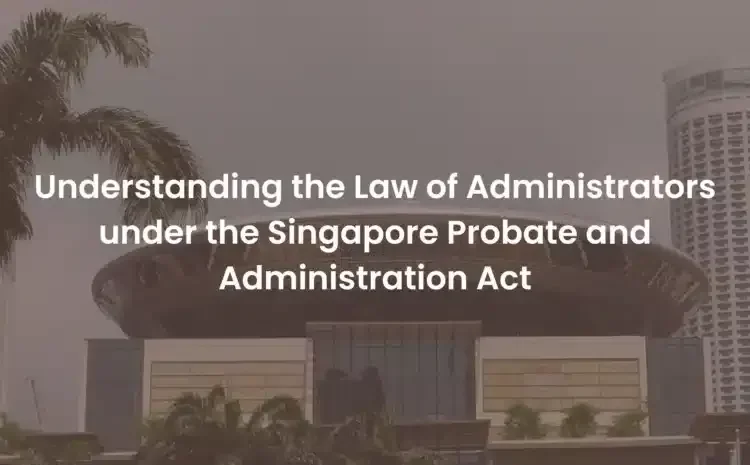Understanding the Law of Administrators under the Singapore Probate and Administration Act
The Probate and Administration Act of Singapore is a vital piece of legislation that governs the process of administering the estates of deceased persons. One key aspect of this process is the appointment of administrators, who are responsible for managing and distributing the estate in accordance with the law. Understanding who has the priority to be appointed as an administrator under this Act is crucial for anyone involved in estate planning or administration.
What is Probate and Administration?
Probate is the legal process that involves proving the validity of a deceased person’s will and distributing their assets according to their wishes. Administration, on the other hand, deals with the distribution of assets when a person dies intestate (without a valid will). The Probate and Administration Act provides the framework for both processes.
Role of Administrators
Administrators are individuals appointed by the court to manage and distribute the estate of a deceased person who did not leave a will. Their duties include collecting the deceased’s assets, paying any debts and taxes, and distributing the remaining assets to the rightful beneficiaries.
Priority of Appointment
The Probate and Administration Act outlines a specific order of priority for who can be appointed as an administrator. This hierarchy helps ensure that the most appropriate and qualified individuals are given the responsibility of managing the estate. Here is the priority list as stipulated by the Act:
Surviving Spouse: The surviving spouse has the highest priority to be appointed as the administrator. This recognizes the spouse’s close relationship with the deceased and their likely understanding of the deceased’s wishes and estate.
Children: If there is no surviving spouse, the children of the deceased come next in line. This includes both biological and legally adopted children. They share an equal right to apply for administration.
Parents: In the absence of a surviving spouse and children, the deceased’s parents are next in line. They have a strong interest in ensuring the proper management and distribution of their child’s estate.
Siblings: If the deceased’s parents are also not available, the siblings of the deceased can apply to be administrators. This includes both full and half-siblings.
Nephews and Nieces: Should there be no surviving spouse, children, parents, or siblings, the nephews and nieces of the deceased are next in the priority order.
Grandparents: The grandparents of the deceased come after nephews and nieces, should there be no closer relatives available.
Uncles and Aunts: If none of the aforementioned relatives are available, the uncles and aunts of the deceased can be appointed as administrators.
Cousins: Finally, if all closer relatives are unavailable, the cousins of the deceased have the right to apply for administration.
Special Circumstances and Court’s Discretion
While the Probate and Administration Act provides a clear order of priority, the court retains discretion to appoint any person it deems fit in special circumstances. This might occur if there is a dispute among the rightful applicants, or if the individuals with priority are deemed unsuitable or incapable of fulfilling the role of administrator.
Conclusion
Understanding the priority for appointment as an administrator under the Singapore Probate and Administration Act is essential for anyone involved in the administration of estates. This hierarchy ensures that those closest to the deceased have the first opportunity to manage the estate, reflecting their likely understanding of the deceased’s wishes and needs. However, the court’s discretion remains a vital tool in ensuring that the administration process is carried out effectively and in the best interests of all parties involved.
For those navigating the probate and administration process, it is advisable to seek legal guidance to ensure compliance with the Act and to facilitate a smooth and fair distribution of the estate.

